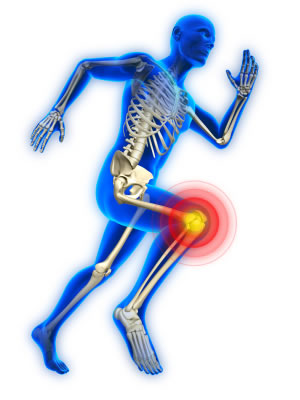Runner's Knee
 Runner’s knee affects a wide variety of athletes. It is in no way exclusive to Runners, but it is extremely common for runners of all ages. Running is especially high contact and the brunt of this impact is experienced by the knee joint. Each time the foot hit the ground, more pressure is exerted on the knee. This pressure is detrimental to the health of one’s knee. At times, a runner’s form can increase the negative effects running can have on the knee. If proper form is not used, the knee will experience more stress because the feet are not dispersing the impact throughout the entire body). The foot’s ability to absorb and disperse impact can also be greatly affected by one’s shoes. If a shoe is worn past a certain point, it will not provide the correct support and the knee will pay. If proper shoes are not chosen for specific foot composition, the effects can also be damaging and cause Runner’s Knee.
Runner’s knee affects a wide variety of athletes. It is in no way exclusive to Runners, but it is extremely common for runners of all ages. Running is especially high contact and the brunt of this impact is experienced by the knee joint. Each time the foot hit the ground, more pressure is exerted on the knee. This pressure is detrimental to the health of one’s knee. At times, a runner’s form can increase the negative effects running can have on the knee. If proper form is not used, the knee will experience more stress because the feet are not dispersing the impact throughout the entire body). The foot’s ability to absorb and disperse impact can also be greatly affected by one’s shoes. If a shoe is worn past a certain point, it will not provide the correct support and the knee will pay. If proper shoes are not chosen for specific foot composition, the effects can also be damaging and cause Runner’s Knee.
The thigh muscles and the hip flexor muscles can greatly affect the development of Runner’s Knee. It is imperative that runner’s do remedial training to strengthen these two muscle groups. The lack of strength in the thighs and hip flexors is one of the leading culprits of runner’s knee. Weakness in these two specific muscle groups create increasing pressure on the knee joint and kneecap. Unfortunately, running does not allow for concentrated strength gain for these vital muscles and the result is worsened runner’s knee pain; continued running results in intensified pain. As the pain increases, so does the inflammation and this combination has been known to sideline many runners. Understanding this all too common ailment is one of the first steps to prevention.

